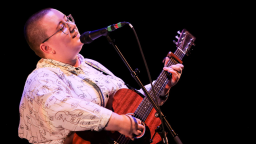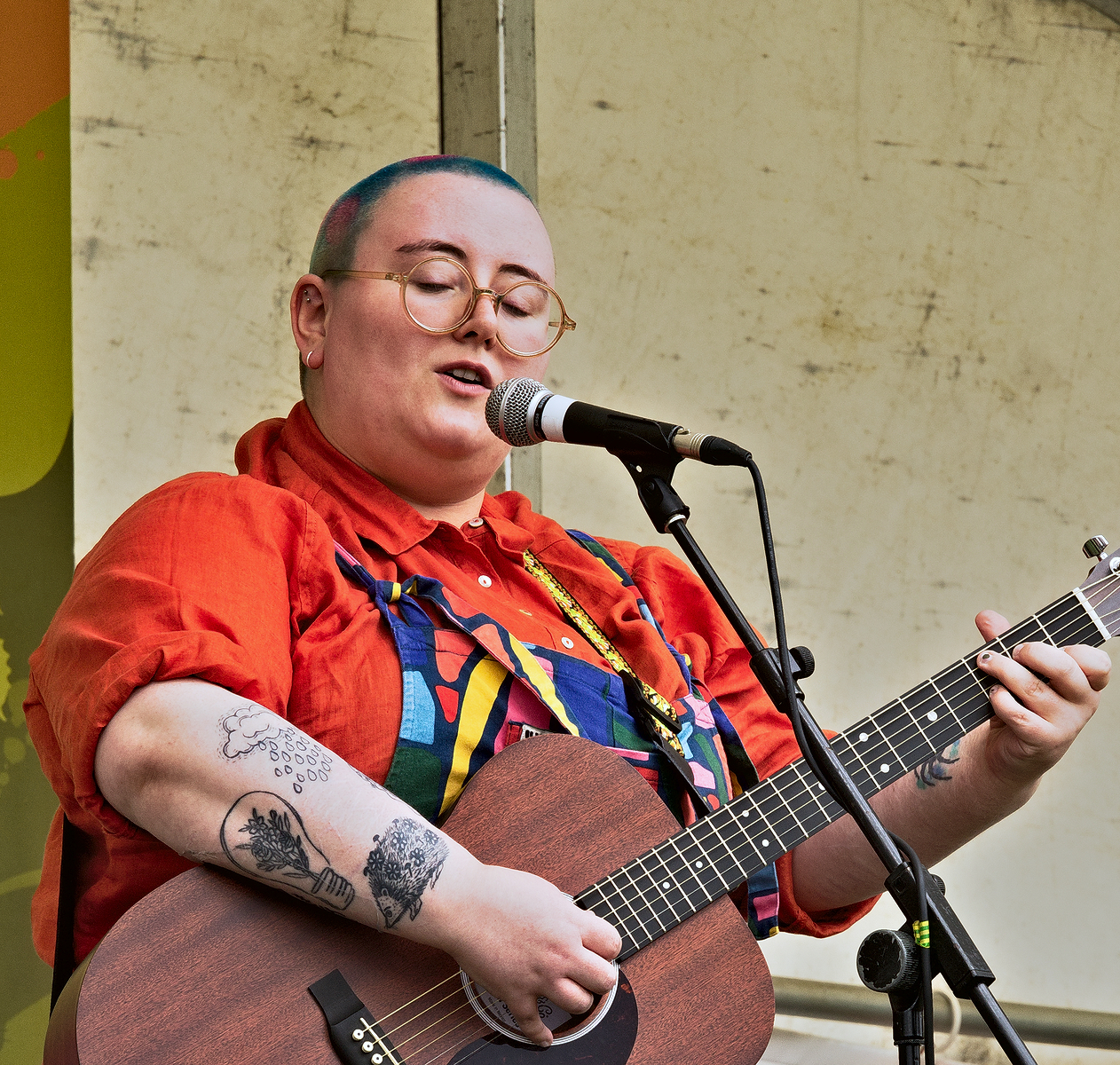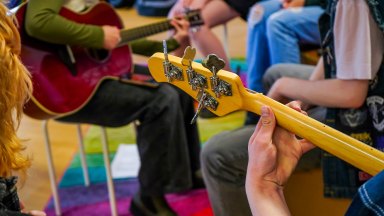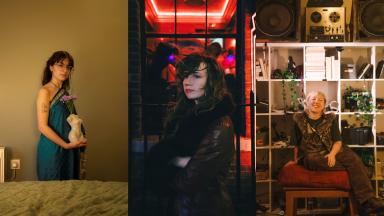
For Pride Month, Youth Music NextGen Fund artist Maddie Morris shares their experience of touring as an LGBTQ+ musician, and how activism through song can impact an audience.
When I write songs, the only thing I really focus on is what I want to say, and how best to say it. I sit in my city centre flat, and sing to a silent room, feeling completely at home in my own space.
As a songwriter, I’ve never written my songs imagining how they’ll feel to sing to a room full of people I don’t know. I’ve wondered at points if that process has created an oversight.
I booked my first ever full UK tour bubbling with early career excitement. I was going to play songs about queer joy, liberation and hope in small venues across England. I never for a second, while writing emails and grafting for opportunities, considered how it might feel, night after night, singing songs that felt like they exposed a little bit of my soul. It felt vulnerable, in the best kind of way, and kind of healing.
I think it's this feeling that led me to choose the title ‘Skin’ for my album. It came from its first single, ‘Marsha P. Johnson’, named after the transgender LGBTQ+ rights activist who was one of the most prominent figures of the gay rights movement of the 1960s and 1970s, and participated in the Stonewall Uprising in New York City. The song’s line “We’re taught to take it on the chin, like a manifesto of our skin” to me means that as queer folk, we’re always expected to just take and accept the aggression towards us, and that like skin, our queerness is often the first thing that takes the blows - it can be both protective but also, easily bruised, and that's beautiful.
I really felt my queerness like a skin on that tour. Sometimes, it felt so protective, I’d enter a venue and have a unique sense that I was really safe. I’d have conversations with folk from cities I’d never been in, and it would feel like we went back years. People would tell me about their identities, their experiences, the lines in songs that resonated with them. On one occasion, a mother came to me in tears telling me about her trans son, saying “I just want him to survive. I just want him to be okay. People are so cruel.”
On other nights, I’d be playing at folk clubs or bars where the audience were of a different demographic. Sometimes singing the words about kissing my girlfriend, or “protesting homophobes” felt vulnerable. I’d ask myself questions like “is that guy in the corner staring daggers at me, or is that his listening face?” I’d start pre-empting a gig, writing alternative songs down the edge of my setlist, just in case I didn’t feel safe. It didn’t happen often, but when it did, I felt it acutely.
The song ‘Marsha P. Johnson’ finished every gig (good or bad) alongside a dedication to her. I felt empowered telling audiences, some who knew her intimately, some completely new to her activism, about the way Marsha fought tirelessly for the rights of the LGBTQ+ Community. I’d speak of her work advocating for LGBTQ+ youth, sex workers, and those with HIV during her life in New York. I told the story of the Stonewall riots, and how Marsha used sex work to afford space to shelter queer and sex working youth. I shared how she spoke up against the racism in the LGBTQ+ liberation movement at the time.
Those moments talking about Marsha were moments where I could really appreciate what a privilege it is to get to be a musician, and what a unique chance it is to really do something. Sometimes I’d look at audiences - a few regular folk club go-ers, a handful of old punks and hippies in their Cropredy t-shirts, sat interspersed with queer youth, and LGBTQ+ families. When else would you get this group of people in a room together? When else would the voice of a queer autistic person be heard without interruption?

After gigs, people would often come up to me, and chat to me about their connections to Marsha. I had a conversation with a woman who had ‘lived through section 28’, and who told me about how painful her school experienced had been. I spoke to a dad who came to two gigs on the tour and told me about sending the song to one of his queer children. He told me how he’d researched her and gave me a few facts he had learnt on his way.
On one night, I chatted to a guy in his 80’s, who held my eye contact while telling how he had been homophobic growing up, and how ashamed he felt about it now. I felt weirdly hopeful hearing this, because if a straight guy in his 80’s is thinking about how to be a better ally, then maybe we’re moving in the right direction. Shortly after, I spoke to a non-binary 20 year old who told me about keeping rats. After the gig, I saw the two of them having a conversation at the bar, and I felt that prickly feeling behind your eyes like when you’re about to cry.
The soaring highs, and crushing lows of being a musician are indicative of the job, right? You get used to them, but you never plan for them. It feels like a huge privilege, and one that I'm so excited to continue to hold.
Connect with Maddie Morris:
Instagram: @maddiemorrismusic
TikTok: @maddiemorrismusic
You may also like...
Tuning into Identity: Music's Role in LGBTQIA+ Self-Exploration
Youth Music NextGen writer, David Simkins, examines the importance of queer representation and identification in music for young people.
Pride Month: Inside Glasgow's Vibrant Queer Club Scene
Youth Music NextGen writer Tiarna Meehan explores the importance of queer music spaces for the LGBTQ+ community in Glasgow.
LGBTQIA+ Artists in Focus
To celebrate LGBT+ History Month, Youth Music NextGen photographer Maia Walker captures portraits of three young, queer musicians based in Liverpool.


